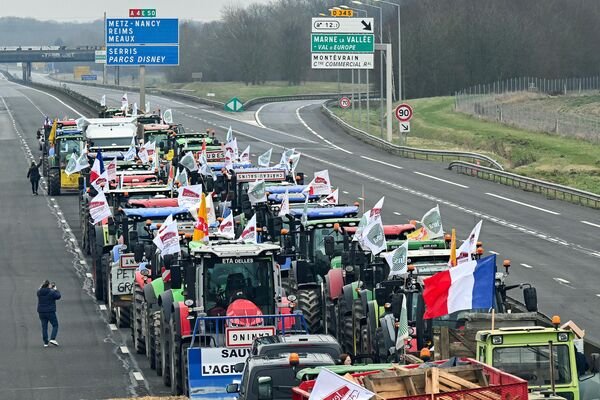Farmers across Belgium, France, and Italy intensified their protests on Wednesday, causing disruptions in major traffic arteries and economic hubs. The farmers are demanding better prices for their produce and less bureaucratic interference in their work. The ongoing protests have had a significant impact on traffic, trade, and daily life, as farmers strategically deploy their tractors to block key routes and access points.
The protests, characterized by tractor blockades, have become a common sight in European capitals, including Berlin, Paris, Brussels, and Rome. The farmers’ actions have brought attention to the challenges they face and their plea for fairer conditions in the agriculture sector. Millions of people in the European Union (EU) have experienced disruptions, from traffic delays to canceled appointments, due to the blockades.
In response to the protests, the European Commission announced plans to shield farmers from the impact of cheap exports from Ukraine during the conflict. The proposal also includes allowing farmers to use some of the land that had been mandated to lie fallow for environmental reasons. While these plans need approval from member states and the EU parliament, they are seen as a symbolic concession to address farmers’ concerns.
EU Commission Vice President Maroš Šefčovič stated, “I just would like to reassure them that we do our utmost to listen to their concerns. I think we are addressing two very important concerns of them right now.” The sudden concessions indicate the EU’s acknowledgment of the challenges faced by farmers and its commitment to addressing their immediate worries.
The protests have revealed the ability of a few hundred tractors to disrupt major economic activities and traffic flow. The impact has been felt not only by farmers but also by businesses and commuters. Sven Pieters of the ECS transport company in Belgium’s Zeebrugge North Sea port highlighted the economic consequences, stating, “It obviously has a major economic impact. Not only for our company but for many companies in Flanders and Belgium.”
The situation is expected to escalate in Belgium on Thursday, with farmers planning to stage protests outside EU headquarters during a summit of government leaders. This move is aimed at putting their issues on the summit agenda and garnering concessions on financial burdens and increased competition from nations such as Chile and New Zealand.
Belgian Prime Minister Alexander De Croo acknowledged the challenges faced by farmers, stating, “It is important that we listen to them.” He emphasized the substantial difficulties farmers encounter, ranging from adapting to climate change to countering environmental pollution. Belgium, currently holding the EU presidency, will address the farmers’ concerns during the summit, which originally centered on providing aid to Ukraine following Russia’s invasion nearly two years ago.
French President Emmanuel Macron has expressed his intention to postpone a free trade deal with South American nations due to strong opposition from EU farmers. This issue is expected to be discussed at the EU summit, reflecting the sensitivity of agricultural policies within the bloc.
Despite the widespread inconveniences caused by the protests, EU governments are approaching the situation with caution, recognizing the legitimate concerns of farmers. The protests have not only highlighted the need for fairer agricultural policies but also demonstrated the ability of farmers to mobilize and advocate for their rights on a pan-European scale.
In Spain, three major farming associations have also joined the protest movement, planning demonstrations in the coming weeks to demand changes in what they perceive as overly restrictive EU policies. The collective efforts of farmers across EU member states underscore the urgency of addressing systemic issues within the agricultural sector to ensure a sustainable and equitable future for European farmers.
